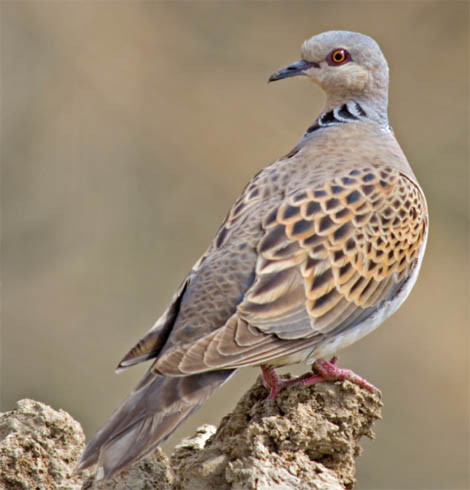 Although the turtledove is disappearing in Portugal and Europe, in Portugal it is possible to kill six turtledoves per hunting day for six weeks, starting on Sunday the 19th, today denounced the Portuguese Society for the Study of Birds (SPEA).
Although the turtledove is disappearing in Portugal and Europe, in Portugal it is possible to kill six turtledoves per hunting day for six weeks, starting on Sunday the 19th, today denounced the Portuguese Society for the Study of Birds (SPEA).
SPEA marked 2012 as the year of the wild turtledove, drawing attention to the urgent need for effective conservation actions, starting with the temporary suspension of its hunting.
According to SPEA, in the last 20 years, the population of the wild turtledove (Streptopelia turtur) in Europe has decreased by 70%. According to the Pan-European Scheme for the Monitoring of Common Birds, for every 100 turtledoves existing across Europe in 1980, there are currently only 30.
In Portugal “the situation is getting worse and worse”, and only between 2004 and 2010 the national populations registered an average decrease of more than 30%, being the only species in the Census of Common Birds (data from the SPEA) to be found in sharp decrease.
For this reason, and since it is allowed to hunt this endangered species, the SPEA asks the hunters to "refrain from hunting wild turtledoves in this hunting season and to the whole society to inform and reflect on the matter".
SPEA believes that "only by being at the forefront of the defense of game species and the responsible management of this resource will we be able to guarantee that in the future it will be possible to continue hunting".
There is a European Union Management Plan for Rola-brava, under the Birds Directive. This plan foresees essential and urgent measures such as the annual publication of credible hunting statistics, the development of a predictive population model to calculate the sustainable annual slaughter, the study of reproductive success and winter mortality and the factors that affect them. But, stresses that entity, «despite the Management Plan being in force since 2006, Portugal has done nothing to apply it».
SPEA also emphasizes that “organisations in the hunting sector recognize the seriousness of the turtle dove problem, but continue to oppose the taking of measures that they consider unfavorable to their activity, and are willing to do very little to reverse the situation". As part of the review of the Venatório Calendar, the SPEA and the other NGOs called for a suspension of turtledove hunting for three years, accompanied by a scientific investigation into the causes of the decline.
But the only thing he got, from the Secretary of State for Forests and Rural Development, who also oversees nature conservation, was a four-day delay in the start of hunting for the species and a reduction in the daily limit for slaughter from eight to six birds.
The hunting season will start on Sunday, August 19th and, for six weeks, each hunter will be able to kill six wild turtledoves per hunting day.
The figures available, which are inaccurate, indicate that at least two million of these birds are hunted annually across Europe. “At the present time, even if only 10% of national hunters go hunting doves only twice and kill only half of what is allowed by law, we will have a slaughter of 90.000 of these birds”, stresses SPEA.
Given the situation of the turtle dove, a slaughter rate of this magnitude, in Portugal and in other countries where it is possible to hunt, could lead the species to extinction, which is already scientifically predicted in countries like the United Kingdom.
SPEA states that it will continue to work with the authorities and organizations in the sector, «for a change towards rigor and responsibility in the management of hunting. It is urgent to stop hunting the wild turtledove, and work so that other countries do the same».
Domingos Leitão, Coordinator of the SPEA's Land Program, states that “the management of hunting, as a natural resource, concerns the entire civil society and not just hunters”. "All of us, hunters and non-hunters, including scientists and journalists, must seriously discuss the subject of the turtle dove and ask the tutelage to take the necessary measures."
The rola-brava was chosen last January by the Portuguese Society for the Study of Birds (SPEA) for the 2012 Bird of the Year.
With this campaign, SPEA intends to obtain a moratorium on turtle dove hunting in Portugal, for a period of three years, so that the precise causes of its disappearance can be studied.
Note: the photo was provided by SPEA and is by Faísca

















Comments